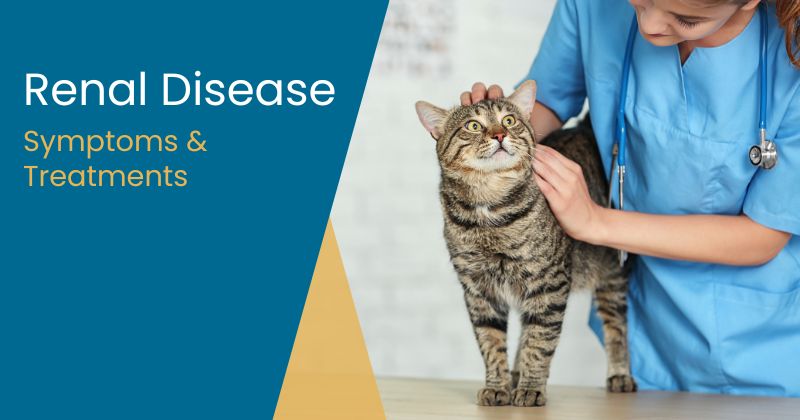
If your cat’s kidneys stop functioning as they should, waste products build up in the bloodstream, which can lead to a range of concerning symptoms known as renal disease. As a cat owner, recognizing the signs of renal disease and seeking veterinary care is key to managing this condition effectively. At Conyers Animal Hospital, we understand how important your cat’s well-being is, and we're here to guide you through the symptoms and treatments for renal disease in cats. If you have concerns about your cat’s kidney health, call us at (770) 483-1551 to schedule an appointment.
Renal disease, otherwise known as kidney disease, in cats is a condition where the kidneys gradually lose their ability to function properly. The kidneys are responsible for filtering toxins and waste from the blood, balancing fluids, and regulating electrolytes. When they fail to perform these duties, waste products build up in the bloodstream, leading to various health problems.
Acute renal failure happens suddenly and can be caused by toxins, infections, or blockages. Chronic kidney disease, on the other hand, develops slowly over time and is often related to aging. While CKD is more common in older cats, it can affect cats of any age. Early detection and treatment can make a significant difference in managing the disease and improving your cat's quality of life.
Catching the signs of renal disease in cats early is vital for effective treatment. Many symptoms of kidney disease can be subtle, so it's important to monitor your cat closely for changes in behavior or physical condition. Common symptoms of renal disease in cats include:
If you notice any of these symptoms in your cat, consult with your veterinarian at Conyers Animal Hospital as soon as possible. Early detection can help manage the progression of renal disease in cats and improve their overall well-being.
A proper diagnosis of renal disease in cats typically involves a thorough examination and a series of tests. Your veterinarian may perform blood tests to measure kidney function, checking for elevated levels of waste products. A urinalysis can provide further information by analyzing the concentration and composition of your cat's urine. In some cases, your veterinarian may also recommend imaging tests, such as ultrasound or X-rays, to assess the structure of the kidneys and identify any abnormalities. These tests can help determine the severity of the disease and guide the appropriate treatment plan.
While renal disease in cats cannot be cured, there are several treatment options available to help manage the condition and improve your cat’s quality of life. The treatment plan will vary based on the stage and severity of the disease, as well as your cat’s individual needs. Common treatments for renal disease in cats include:
The prognosis for cats with renal disease varies depending on the stage of the disease and how well it is managed. Cats diagnosed with chronic kidney disease can live for several months to several years with proper treatment. Early diagnosis and a comprehensive treatment plan can greatly improve the quality of life for cats with renal disease, allowing them to continue enjoying a comfortable and happy life. It’s important to work closely with your veterinarian at Conyers Animal Hospital to tailor a treatment plan to your cat’s needs. With the right care and attention, many cats with renal disease can live longer, healthier lives.
While it’s not always possible to prevent renal disease in cats, especially as they age, there are steps you can take to promote kidney health and reduce the risk of developing kidney issues.
Ways to help prevent renal disease in cats include:
Renal disease in cats is a serious condition, but with the right care and management, many cats can continue to live comfortable, happy lives. Regular monitoring, appropriate treatment, and supportive care are essential for managing the disease and maintaining your cat’s well-being.
If you suspect your cat may be showing signs of renal disease, contact Conyers Animal Hospital at (770) 483-1551 or request an appointment today to ensure your cat receives the care they need. Our experienced team is here to support you and provide the best possible care for your feline friend.
Closed from 1-2pm daily for lunch
*Saturday Walk-ins available on a first-come, first-served basis. Wait times vary, and you may be turned away if we reach capacity.


